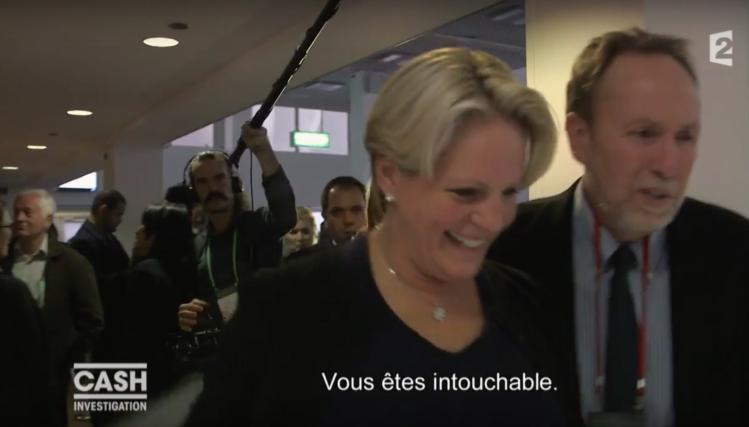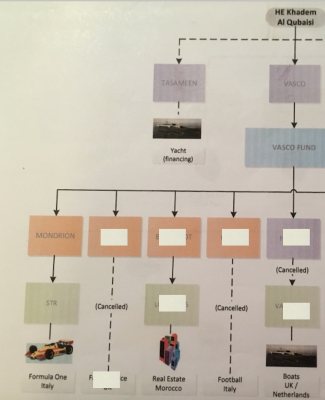
The Luxembourg newspaper Luxemburger Wort reported Thursday that it has emerged that at the end of June no less than 90 police, accompanied by prosecutors and a federal judge launched a massive raid on the headquarters of the private bank Edmond de Rothschild (BPERE).
The scale of the operation against a financial institution was unprecedented the paper explained and it was linked to the bank’s involvement in 1MDB, described as “possibly the largest money laundering operations ever uncovered in the Grand Duchy”.
It means that yet another of the world’s most prestigious and in this case oldest banks has been caught red-handed over its willingness to handle the proceeds of grand-scale corruption from countries like Malaysia.
Before the raid, the Chief Executive Arianne de Rothschild (see featured image) had brushed aside journalists and laughed smugly when assured by her associates that she and her bank were “untouchable”. It was caught on camera.
The cause of the Luxembourg investigation lies with the banking transactions carried out by the bank CEO Marc Ambroisien on behalf of the now arrested former IPIC boss Khadem Al Qubaisi (KAQ).
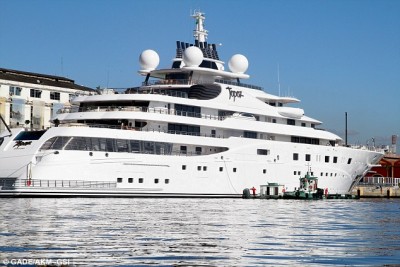
As earlier exposed by Sarawak Report, Ambroisien, who has now been sacked, managed a web of private companies for KAQ, both during and after his role as Chief Executive of the bank, using off-shore secrecy to hide their activities. Ambroisien remained director of these companies and also a number of French property holding companies on KAQ’s behalf until just a few days ago.
Sarawak Report has demonstrated how through these companies stolen 1MDB money was used to fund multi-million dollar payments for the purchase of the Topaz super-yacht attributed to the Abu Dhabi Sheikh Mansour, but used by KAQ and his circle of friends, including Jho Low and Leo di Caprio.
Cash also flowed into the shareholder company which owns the Hakkasan entertainment chain, which observers believe has seen over a billion dollars worth of investment over the past four years.
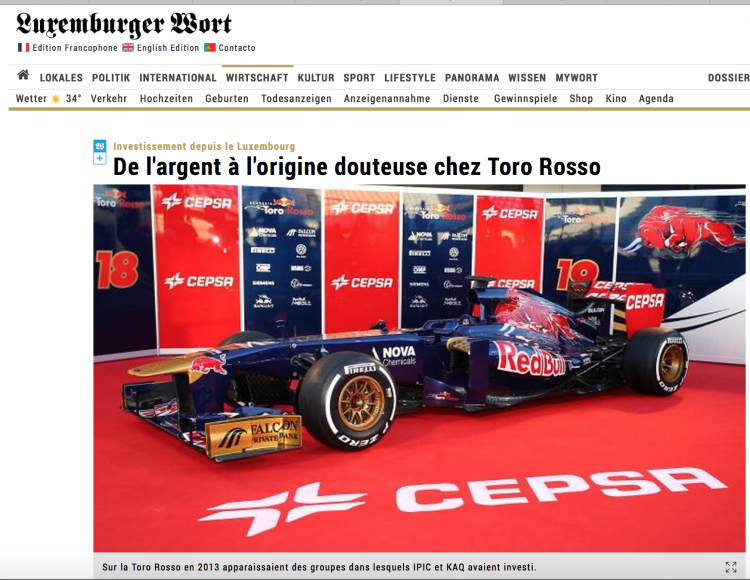
Another of the companies set up under KAQ’s Vasco Trust umbrella, managed by BPERE, was the Luxembourg-registered Mondrion, which bought a 25% share in the Italian Formula One racing team Scuderia Torro Rosso (STR) back in 2011.
That investment of 20 million euros took place not long after KAQ had made his first serious cash from “commissions” over the Barclays Bank bail out deal financed by IPIC, of which he was the CEO. Statements show that between 2010 and 2012 almost $100 million was funnelled into Vasco by KAQ.
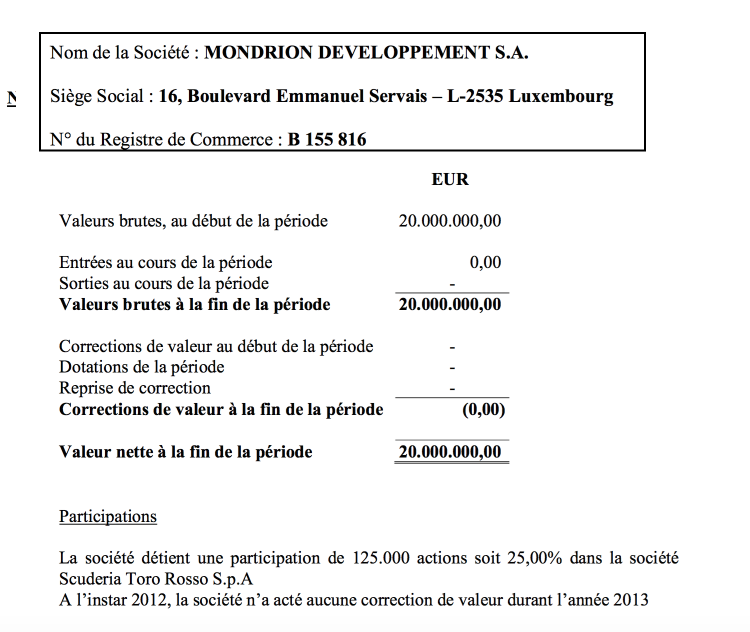
Luxemburger Wort then detailed how the sovereign wealth fund entrepreneur then apparently used his influence as the CEO of IPIC to channel money into sponsoring the team in which he held such a significant private stake.
IPIC subsidiaries used to sponsor STR included the Spanish oil giant CEPSA, Canada’s Nova Chemicals and Falcon Bank.
Indeed in 2013 speculation was rife that IPIC would buy up the whole team from majority owner Red Bull.
“The IPIC involvement is led by it’s boss Khadem Al Qubaisi, who has been a regular fixture at Grands Prix in recent years and informed paddock opinion sees this group becoming shareholders in a team soon, perhaps Toro Rosso, depending on Red Bull’s long term strategy for its junior team” [F1 commentary]
Pattern of conflict of interest
Analysis has shown that KAQ repeated this pattern, exhibiting a clear conflict of interest in his management of a number of the key companies he controlled within the IPIC group. Put simply, he employed public money from the sovereign fund that he managed to back projects in which he had privately invested.
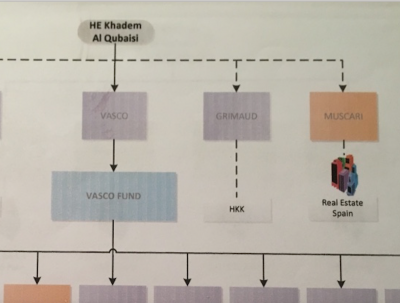
The Financial Times has already revealed, for example, how he located the CEPSA headquarters in a building he himself had leased, thereby ensuring a very good return.
The extent to which this selfishly orientated decision-making affected the well-being of the fund is now being examined by Khadem’s successors in Abu Dhabi, where he has finally been put under arrest.
After all, Aabar is believed to have lost at least $50 billion from its original $70 billion cash base and the fund, along with its parent company IPIC, is now being merged with the country’s other sovereign fund Mubadala.
Sarawak Report has further exposed how KAQ used Aabar to finance his own company’s bid to buy out Europe’s most expensive building, the Santander complex in Madrid, and also to back a number of property ventures by his Tasameem Real Estate Company in New York. KAQ companies would take shares and Aabar would invest in the venture.
The KAQ obsession with fast cars, yachts, racing teams and other entertainments also appears to have featured as a major problem is this pattern of misappropriation
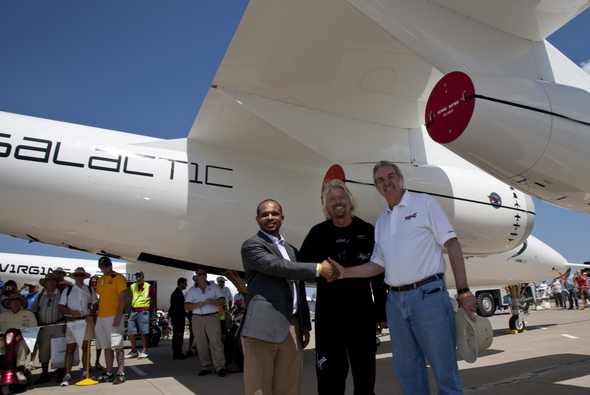
Indeed, one of the biggest loss-making enterprises into which Aabar poured hundreds of millions of dollars was Richard Branson’s Virgin Glactica project, which has collapsed after recent test-flight disasters.
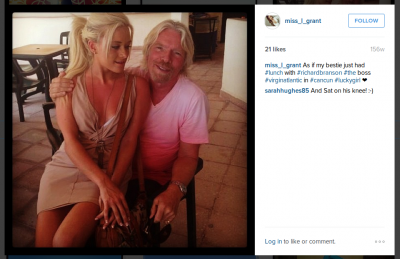
Branson partied with KAQ in Cancun and was featured with one of his youthful friends at the resort on Facebook.
But the project went down in flames at enormous cost, as did so many of the other grandiose ventures.
In fact, the disastrous mismanagement of Aabar /IPIC and the arrest of its former boss KAQ amidst a developing multi-billion dollar scandal, may well turn into a key lesson for countries that are running sovereign wealth funds, which are headed by political figures and beset by weak corporate governance. Such organisations are set up to be corrupted.
But all this was well into the future when the youthful Jho Low first approached Prime Minister Najib in 2009 with his suggestion for a similar Arab-style sovereign wealth fund for Malaysia.
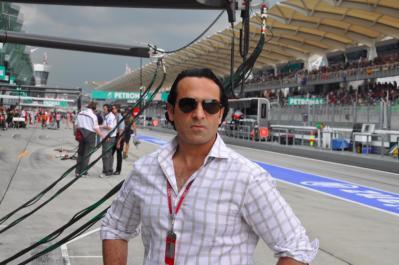
Since 1MDB was immediately used to steal money, it is plain that his pitch had been that sovereign wealth funds are a proven method of diverting billions under the protective cover of ‘country to country’ joint ventures, diplomatic deals and top official oversight.
Once Najib took the bait, Jho Low was soon linking up with his pal from Aabar to join the plunder.
Now that both of these flamboyant, party-loving looters have come a cropper, Malaysia has perhaps just one thing to be thankful of, which is that 1MDB’s $7 billion missing is far less than what is now missing from Aabar.

